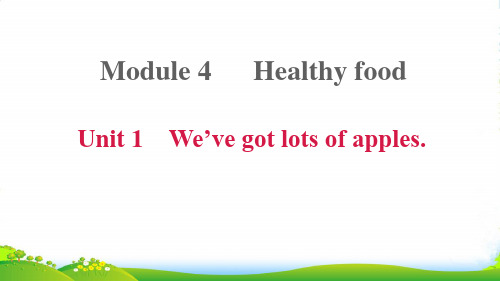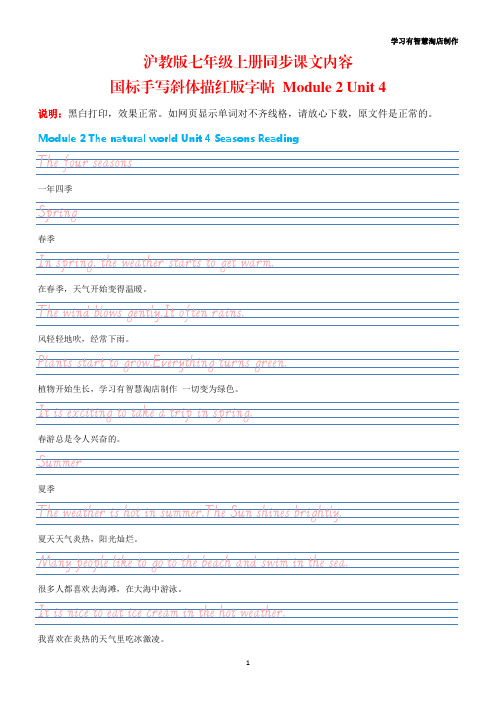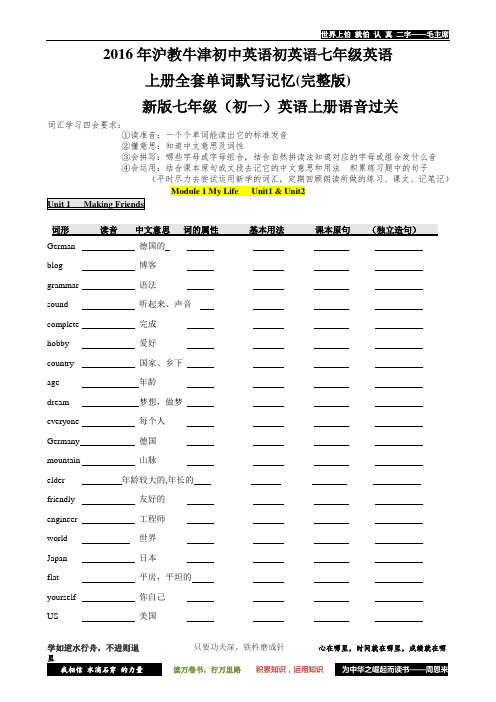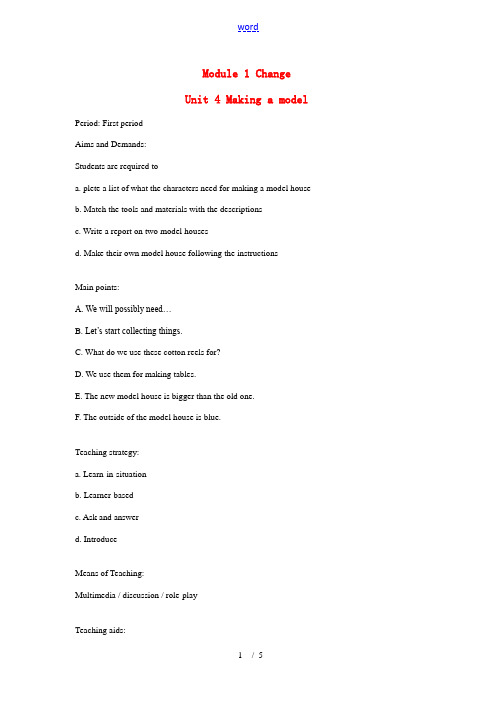初中英语牛津七年级上 Module 1 Unit 4
牛津译林版英语七年级上册Unit1 Reading 课件

Look at the pictures, the title and the sub-headings on P3. Then tick (√) the things that you may find in Anna's blog.
1 her country
□√
2 her age
□√
3 her parents' names □
Now try to introduce yourself to your partner from these aspects.
•Name: •Country: •Age: •What you look like: •Family members: •Hobbies:
1.Hello, everyone.
are
4.aaTlhlhevaseepCorfp1yatyrfhDereiomewnyybdoolrfuyadn.vksiocniuenorwaiintteatdhlhiekcosibmn?bdeFieaisnn.idngs
a thoinugtsthIemcuosrtredcot answers. (P 4)
Read Para. 3 and 4 and answer the questions.
1.How does she go to school? She goes to school by school bus.
2.What are her favourite subjects? Maths, Art and Science.
5.What does “e-friend” mean to Hi? It means a friend from the Internet.
牛津新沪教版初中英语七年级上册unit1课件

Who意思是“谁”,对人物提问
Whose意思是“谁的”,对事物所有者提问,后面跟名词
Why意思是“为什么”,对原因提问,用because+句子回答
What color意思是“什么颜色”,对颜色提问。
how意思是“怎么样”,对方式方法提问
整理ppt
12
Summary
How old 意思是“多大”,问年龄。
Jason: He goes to school by bus.
Mandy: (4) _W__h__a_t__ are his hobbies?
Jason: Swimming and playing football. He likes an English football team.
Mandy: There are many English football teams. (5)_W__h__ic_h__ team
牛津新沪教版初中英语七年级 上册unit1
陈老师
My life Oxford English
Module 1
Unit
1
Anna's Blog
• Hello everyone. __________ to my blog. • My ______ is Anna. I’m ____ Germany. I’m 11 • ______ old. I’m tall and thin. I have
_________.
• I _________ my family in a house _____________some ___________. My mum is ____ ________ teacher. My dad is a doctor. I have an _______ sister and an ________
七年级英语上 Module 4 Healthy food Unit 1 We've got l

18. — Jenny, what’s your favourite ___B__ ?
— I like bananas best.
A. vegetable
B. fruit
C. meat
D. drink
19. — Have you got any tomatoes? I want to buy some.
14. There are all kinds of ___d_r_i_n_k_s__ (drink) in the supermarket.
15. There are some _t_o_m__a_to_e_s__ (tomato) and _p_o_t_a_t_o_e_s__ (potato) in the basket.
What about some tea (茶) ? 4. Would you like some coffee (咖啡) ? 5. I’d like to drink some orange juice (果汁) .
6. Please give me a glass of water (水) . 7. Do you like milk (牛奶) ? 8. Have you got any meat (肉) ? 9. I have got all kinds (种类) of vegetables at home. 10. Have we got any chocolate (巧克力) ?
C. bad for
D. bad to
【点拨】句意为“不要喝可乐。它对你的健康不 好。”be good for意为“对……有好处”,故选B。
24. [ 安徽合肥瑶海区期中]—Would you like a cup of tea?
初中英语 外研社七年级初一上册Module1至Module5知识点

M 1 classmatesUni t 11.Chinese 中国的,中国人的,中国人,汉语其中Chinese指“中国人”时,单复数同形。
We are Chinese.She is a Chinese.国家语言某国人某国人的复数形式China Chinese Chinese ChineseJapan Japanese Japanese JapaneseEngland English Englishman EnglishmenFrance French Frenchman FrenchmenAmerica English American AmericansCanada English Canadian CanadiansRussia Russian Russian Russians Australia English Australian Australians Germany German German Germans2.MS 女士Ms 女士,用来称呼不了解婚姻状况的女性。
Miss 小姐、女士,用来称呼未婚女性。
Mrs 夫人、太太,用来称呼已婚女性。
Mr 先生,用来称呼男性,无论年龄大小结婚与否。
3.our 我们的。
形容词性物主代词。
物主代词:人称单数复数第一人称My我的Our我们的第二人称Your你的Your你们的第三人称His他的Their他们的Her她的Its它的4.Where + be + 主语 + from? “XX来自哪里?”或者“XX是哪里人?”对地点进行提问使用特殊疑问词“where”主语 + be from +地点“XX从哪里来,来自于…..”be from = come fromWe are from China=We come from China.5.How old are you ? How old + be + 主语?“XX多大?”其中,be动词要与主语一致。
6.What abour….?”……怎么样?”7.Welcome to + 地点名词“欢迎来到……”若welcome后跟here there home 等地点副词的时候,去掉to,变为“welcome here! 欢迎来到这里!”Unite 21.everyone 做主语的时候,谓语动词为第三人称单数形式。
07A沪教牛津版七年级英语上册课文原文及翻译国标手写斜体描红版字帖Unit4

沪教版七年级上册同步课文内容国标手写斜体描红版字帖Module2Unit4说明:黑白打印,效果正常。
如网页显示单词对不齐线格,请放心下载,原文件是正常的。
Module2The natural world Unit4Seasons ReadingThe four seasons一年四季Spring春季In spring,the weather starts to get warm.在春季,天气开始变得温暖。
The wind blows gently.It often rains.风轻轻地吹,经常下雨。
Plants start to grow.Everything turns green.植物开始生长,学习有智慧淘店制作一切变为绿色。
It is exciting to take a trip in spring.春游总是令人兴奋的。
Summer夏季The weather is hot in summer.The Sun shines brightly.夏天天气炎热,阳光灿烂。
Many people like to go to the beach and swim in the sea.很多人都喜欢去海滩,在大海中游泳。
It is nice to eat ice cream in the hot weather.我喜欢在炎热的天气里吃冰激凌。
Autumn秋季In autumn,everything changes.在秋天,一切都改变了。
Leaves turn brown,red or yellow and start falling from the trees.叶子变成棕色、红色或黄色,学习有智慧淘店制作并开始从树上落下。
It is nice to go on a picnic at this time of year because the weatheris cool and dry.我喜欢在每年的这个时候去野餐,因为这时天气凉爽而干燥。
初中英语-译林牛津版七年级上下册知识梳理—思维导图课件全文

My school
人称代词(主格和宾格)
Unit 4 My day
School life
Are you happy ?
1. 表示时间的介词in/ on/at的用法2.频度副词(位置、频率高低)
8
7A教材目录
Grade
Unit
Reading
Task
Grammar
31
教材辅导建议
二、牛津教材教学问题及建议
让学生通过阅读再现和积累词汇,达到增加词汇量的目的。
进行适当的句子背诵,通过语言的反复输入,强化语言句式结构,并进行模仿。
针对优等生每单元拓展语法学习的深度,增加阅读的补充材料,增加词汇量,输入更多地道的语言。
学习了牛津教材还不够应付考试,教师还必须补充课外内容,如每单元增加相关的拓展阅读、词汇和口语训练。
Going shopping
Let's go shopping !
1. 用some和any表示数量2. There be结构(就近原则)
Unit 8 Fashion
The fashion show
Designing clothes
现在进行时(1.提示标志2.不用于现在进行时的动词3.动词的现在分词构成规则4.现在进行时的否定句、一般疑问句和特殊疑问句)
My hometown
1.名词所有格2.形容性物主代词和名词性物主代词
Unit 4 Finding your way
A trip to the zoo
An invitation letter
1.冠词a/ an/ the的用法2.方位介词搭配
19
7B教材目录
牛津上海版初中英语七年级上册(英语单词表)

牛津上海版初中英语七年级上册(英语单词表,带发音)Module 1 Unit 1invite英音 [ɪnˈvaɪt]美音 [ɪnˈvaɪt]n. 邀请 vt. 邀请,招待;招致expensive英音 [ɪkˈspensɪv]美音 [ɪkˈspensɪv]adj. 昂贵的;花钱的talk to na. 向…谈;〔口语〕申斥brochure英音 [ˈbrəʊʃə(r)]美音 [broʊˈʃʊr]n. 手册,小册子agent英音 [ˈeɪdʒənt]美音 [ˈeɪdʒənt]n. 代理人,代理商;药剂;特工 adj. 代理的vt. 由…作中介;由…代理soon英音 [suːn]美音 [suːn]adv. 快;不久,一会儿;立刻;宁愿at the end of na. 在…末端;在…的结尾at the end ofAugust无swan英音 [swɒn]美音 [swɑːn]n. 天鹅;天鹅星座 vi. 游荡,闲荡raise英音 [reɪz]美音 [reɪz]n. 高地;上升;加薪 vt. 提高;筹集;养育;升起 vi. 上升national英音 [ˈnæʃ(ə)nəl]美音 [ˈnæʃnəl]adj. 国家的;国民的;民族的;国立的 n. 国民brick英音 [brɪk]美音 [brɪk]n. 砖,砖块;砖形物;心肠好的人 adj. 用砖做的;似砖的 vt. 用砖砌stone英音 [stəʊn]美音 [stoʊn]n. 石头;结石;[宝] 宝石 adj. 石的,石制的vt. 向扔石块;用石头铺mountain英音 [ˈmaʊntən]n. 山;山脉Module 1 Unit 2美音 [ˈma ʊntn]ancient英音 [ˈe ɪn ʃənt]美音 [ˈe ɪn ʃənt]n. 古代人;老人 adj. 古代的;古老的,过时的;年老的history英音 [ˈh ɪst(ə)ri]美音 [ˈh ɪstri]n. 历史,历史学;历史记录;来历interest英音 [ˈɪntr əst]美音 [ˈɪntr əst; ˈɪntrest]n. 兴趣,爱好;利息;趣味;同行 vt. 使……感兴趣;引起……的关心;使……参与holiday英音 [ˈh ɒl əde ɪ]美音 [ˈhɑːl əde ɪ]n. 假日;节日;休息日 vi. 外出度假wonderful英音 [ˈw ʌnd əf(ə)l]美音 [ˈw ʌnd ərf(ə)l]adj. 极好的,精彩的,绝妙的;奇妙的;美妙;胜;神妙another英音 [əˈn ʌðə(r)]美音 [əˈn ʌðər]prep. 另一个;另一个人 adj. 又一,另一;另外的;不同的 pron. 另一个;又一个officer英音 [ˈɒf ɪs ə(r)]美音 [ˈɑːf ɪs ər]n. 军官,警官;公务员,政府官员;船长 vt.指挥society英音 [s əˈsa ɪəti]美音 [s əˈsa ɪəti]n. 社会;交往;社团;社交界prevention英音 [pr ɪˈven ʃn]美音 [pr ɪˈven ʃn]n. 预防;阻止;妨碍cruelty英音 [ˈkru ːəlti]美音 [ˈkru ːəlti]n. 残酷;残忍;残酷的行为someone英音 [ˈs ʌmw ʌn]美音 [ˈs ʌmw ʌn]pron. 有人,某人puppy英音 [ˈp ʌpi]美音 [ˈp ʌpi]n. 小狗,幼犬thirsty英音 [ˈθɜːsti]美音 [ˈθɜːrsti]adj. 口渴的,口干的;渴望的,热望的lovely英音 [ˈlʌvli]美音 [ˈlʌvli]adj. 可爱的;令人愉快的;爱恋的;秀丽的,优美的 n. 美女;可爱的东西as英音 [əz]美音 [əz; æz]conj. 因为;随着;虽然;依照;当…时 prep.如同;当作;以…的身份 adv. 同样地;和……prefer英音 [prɪˈfɜː(r)]美音 [prɪˈfɜːr]vt. 更喜欢;宁愿;提出;提升 vi. 喜欢;愿意care英音 [keə(r)]美音 [ker]n. 关怀;照料;谨慎;忧虑 vt. 在意;希望或喜欢 vi. 照顾;关心;喜爱;顾虑take care of na. 照看;处理;清除booklet英音 [ˈbʊklət]美音 [ˈbʊklət]n. 小册子special英音 [ˈspeʃ(ə)l]美音 [ˈspeʃl]n. 特使,特派人员;特刊;特色菜;专车;特价商品 adj. 特别的;专门的,专用的chew英音 [tʃuː]美音 [tʃuː]n. 咀嚼;咀嚼物 vi. 细想,深思 vt. 嚼碎,咀嚼basket英音 [ˈbɑːskɪt]美音 [ˈbæskɪt]n. 篮子;(篮球比赛的)得分;一篮之量;篮筐 vt. 装入篮blanket英音 [ˈblæŋkɪt]美音 [ˈblæŋkɪt]n. 毛毯,毯子;毯状物,覆盖层 adj. 总括的,全体的;没有限制的 vt. 覆盖,掩盖;…unkind英音 [ˌʌnˈkaɪnd]美音 [ˌʌnˈkaɪnd]adj. 无情的;不仁慈的,不厚道的clinic英音 [ˈklɪnɪk]美音 [ˈklɪnɪk]n. 临床;诊所vet 英音 [vet]美音 [vet]n. 兽医 vt. 审查;诊疗 vi. 作兽医;诊疗cave英音 [keɪv]美音 [keɪv]n. 洞穴,窑洞 vi. 凹陷,塌落;投降 vt. 使凹陷,使塌落;在…挖洞穴guard英音 [ɡɑːd]美音 [ɡɑːrd]n. 守卫;警戒;护卫队;防护装置 vi. 警惕 vt.保卫;监视Module 1 Unit 3blind 英音 [bla ɪnd]美音 [bla ɪnd]n. 掩饰,借口;百叶窗 adj. 盲目的;瞎的 vt.使失明;使失去理智adv 盲目地;看不见地safely 英音 [ˈse ɪfli]美音 [ˈse ɪfli]adv. 安全地 稳定地police 英音 [p əˈli ːs]美音 [p əˈli ːs]n. 警察,警方;治安 adj. 警察的;有关警察的 vt. 监督;管辖;维持治安;为…配备警察thief 英音 [θi ːf]美音 [θi ːf]n. 小偷,贼missing英音 [ˈm ɪs ɪŋ]美音 [ˈm ɪs ɪŋ]adj. 失踪的;缺少的 v. 错过(miss的ing形式);想念;漏掉hunt 英音 [h ʌnt]美音 [h ʌnt]n. 狩猎;搜寻 vt. 打猎;搜索 vi. 打猎;搜寻foreigner英音 [ˈf ɒr ən ə(r)]美音 [ˈf ɔːr ən ər]n. 外地人,外国人crowded英音 [ˈkra ʊd ɪd]美音 [ˈkra ʊd ɪd]adj. 拥挤的;塞满的 v. 拥挤(crowd的过去分词)example英音 [ɪɡˈzɑːmp(ə)l]美音 [ɪɡˈzæmpl]n. 例子;榜样 vt. 作为…的例子;为…做出榜样 vi. 举例for example英音 [f ɔ: iɡˈzɑ:mpl]美音 [f ɔr ɪɡˈzæmp əl]na. 例如Canada英音 [ˈkæn əd ə]美音 [ˈkæn əd ə]n. 加拿大(北美洲国家)Canadian英音 [k əˈne ɪdi ən]美音 [k əˈne ɪdi ən]n. 加拿大人 adj. 加拿大(人)的Australia英音 [ɒˈstre ɪli ə]美音 [ɔːˈstre ɪli ə]n. 澳大利亚,澳洲Australian英音 [ɒˈstre ɪli ən]美音 [ɔːˈstre ɪli ən]adj. 澳大利亚的,澳大利亚人的 n. 澳大利亚人India英音 [ˈɪndiə]美音 [ˈɪndiə]n. 印度(南亚国家)Indian英音 [ˈɪndiən]美音 [ˈɪndiən]n. 印度人;印第安人;印第安语 adj. 印度的;印第安人的;印第安语的Britain英音 [ˈbrɪt(ə)n]美音 [ˈbrɪt(ə)n]n. 英国;不列颠Briton英音 [ˈbrɪtn]美音 [ˈbrɪtn]n. 英国人;大不列颠人Japanese英音 [ˌdʒæpəˈniːz]美音 [ˌdʒæpəˈniːz]n. 日本人;日语 adj. 日本(人)的;日语的penfriend英音 [ˈpenfrend]美音 [ˈpenfrend]n. <英>笔友magazine英音 [ˌmæɡəˈziːn]美音 [ˈmæɡəziːn]n. 杂志;弹药库;胶卷盒sex 英音 [seks]美音 [seks]n. 性;性别;性行为;色情 vt. 引起…的性欲;区别…的性别nationality英音 [ˌnæʃəˈnæləti]美音 [ˌnæʃəˈnæləti]n. 国籍,国家;民族;部落international英音 [ˌɪntəˈnæʃ(ə)nəl]美音 [ˌɪntərˈnæʃnəl]n. 国际组织;国际体育比赛;外国居留者;国际股票 adj. 国际的;两国(或以上)国家的…British英音 [ˈbrɪtɪʃ]美音 [ˈbrɪtɪʃ]n. 英国人 adj. 英国的;英国人的;大不列颠的yourself英音 [jɔːˈself]美音 [jɔːrˈself; jʊrˈself; jərˈself]pron. 你自己male英音 [meɪl]美音 [meɪl]adj. 男性的;雄性的;有力的 n. 男人;雄性动物Toronto英音 [təˈrɒntəʊ]美音 [təˈrɑːntoʊ]n. 多伦多(加拿大城市)Module 2 Unit 4junior 英音 [ˈd ʒu ːni ə(r)]美音 [ˈd ʒu ːni ər]adj. 年少的;后进的;下级的 n. 年少者,晚辈;地位较低者;大学三年级学生block英音 [bl ɒk]美音 [blɑːk]n. 块;街区;大厦;障碍物 adj. 成批的,大块的;交通堵塞的 vt. 阻止;阻塞;限制;…architect英音 [ˈɑːk ɪtekt]美音 [ˈɑːrk ɪtekt]n. 建筑师 缔造者construction英音 [k ən ˈstr ʌk ʃn]美音 [k ən ˈstr ʌk ʃn]n. 建设;建筑物;解释;造句company英音 [ˈk ʌmp əni]美音 [ˈk ʌmp əni]n. 公司;陪伴,同伴;连队 vt. 陪伴 vi. 交往type英音 [ta ɪp]美音 [ta ɪp]n. 类型,品种;模范;样式 vt. 打字;测定(血等)类型 vi. 打字removal英音 [r ɪˈmu ːv(ə)l]美音 [r ɪˈmu ːvl]n. 免职;移动;排除;搬迁ambulance英音 [ˈæmbj əl əns]美音 [ˈæmbj əl əns]n. [车辆][医] 救护车;战时流动医院rescue英音 [ˈreskju ː]美音 [ˈreskju ː]n. 营救;援救;解救 vt. 营救;援救deliver英音 [d ɪˈl ɪv ə(r)]美音 [d ɪˈl ɪv ər]n. 投球 vt. 交付;发表;递送;释放;给予(打击);给…接生 vi. 实现;传送;履行;…parcel英音 [ˈpɑːs(ə)l]美音 [ˈpɑːrsl]n. 包裹,小包 vt. 打包;捆扎neighbour英音 [ˈne ɪb ə(r)]美音 [ˈne ɪb ər]n. n. 邻居;同胞;仁慈的人 vt. 邻接 vi. 住在邻近;毗邻;友善,和睦 adj. 邻居的;邻近的meeting英音 [ˈmi ːt ɪŋ]美音 [ˈmi ːt ɪŋ]n. 会议;会见;集会;汇合点 v. 会面;会合(meet的ing形式)manager英音 [ˈmæn ɪd ʒə(r)]n. 经理;管理人员Module 2 Unit 5美音 [ˈmæn ɪd ʒər]take notes na. 做记录accident英音 [ˈæks ɪd ənt]美音 [ˈæks ɪd ənt]n. 事故;意外;[法] 意外事件;机遇towards英音 [t əˈw ɔːdz]美音 [t ɔːrdz]prep. 朝,向;对于;有助于knock down na. 打倒;拆除;拆卸;(拍卖时)敲槌卖出catch fire na. 着火both ... and ...既...又...motorcyclist英音 [ˈm əʊt əsa ɪkl ɪst]美音 [ˈmo ʊt ərsa ɪkl ɪst]n. 骑摩托车的人;乘机车者hurt英音 [h ɜːt]美音 [h ɜːrt]n. 痛苦;危害;痛苦的原因 vt. 使受伤;损害;使疼痛;使痛心 adj. 受伤的;痛苦的;…run away na. 私奔;逃;弄不好broken英音 [ˈbr əʊk ən]美音 [ˈbro ʊk ən]v. 折断;打碎;损坏(break的过去分词)adj. 破碎的;坏掉的arm英音 [ɑːm]美音 [ɑːrm]n. 手臂;武器;袖子;装备;部门 vt. 武装;备战 vi. 武装起来engine英音 [ˈend ʒɪn]美音 [ˈend ʒɪn]n. 引擎,发动机;机车,火车头;工具fire engine英音 ['fa ɪə 'end ʒɪn]美音 [ˈfa ɪər ˈend ʒɪn]n. 消防车;救火车scene 英音 [si ːn]美音 [si ːn]n. 场面;情景;景象;事件carry英音 [ˈkæri]美音 [ˈkæri]n. 运载;[计] 进位;射程 vi. 能达到;被携带;被搬运 vt. 拿,扛;携带;支持;搬运choose英音 [t ʃu ːz]vt. 选择,决定 vi. 选择,挑选美音 [tʃuːz]bedroom英音 [ˈbedruːm]美音 [ˈbedruːm; ˈbedrʊm]n. 卧室 adj. 两性关系的;城郊住宅区的untidy英音 [ʌnˈtaɪdi]美音 [ʌnˈtaɪdi]adj. 不整洁的,凌乱的;懒散的;不干净利落的,不简练的;不适宜的 v. 使不整洁;使杂…tidy英音 [ˈtaɪdi]美音 [ˈtaɪdi]n. 椅子的背罩 adj. 整齐的;相当大的 vi. 整理;收拾 vt. 整理;收拾;弄整齐tidy up v. 整理干净wardrobe英音 [ˈwɔːdrəʊb]美音 [ˈwɔːrdroʊb]n. 衣柜;行头;全部戏装living room英音 ['lɪvɪŋ ru:m]美音 [ˈlɪvɪŋ ruːm]n. 客厅;起居室bathroom英音 [ˈbɑːθruːm; ˈbɑːθrʊm]美音 [ˈbæθruːm]n. 浴室;厕所;盥洗室balcony英音 [ˈbælkəni]美音 [ˈbælkəni]n. 阳台;包厢;戏院楼厅estate英音 [ɪˈsteɪt]美音 [ɪˈsteɪt]n. 房地产;财产;身份agency英音 [ˈeɪdʒənsi]美音 [ˈeɪdʒənsi]n. 代理,中介;代理处,经销处matter英音 [ˈmætə(r)]美音 [ˈmætər]n. 物质;事件 vi. 有关系;要紧suburb英音 [ˈsʌbɜːb]美音 [ˈsʌbɜːrb]n. 郊区;边缘helper英音 [ˈhelpə(r)]美音 [ˈhelpər]n. 助手,帮手sofa英音 [ˈsəʊfə]美音 [ˈsoʊfə]n. 沙发;长椅Module 2 Unit 6next to prep. 紧邻;在…近旁;仅次于;紧接set英音 [set]美音 [set]n. [数] 集合;一套;布景;[机] 装置 adj. 固定的;规定的;固执的 vi. (日,月)落沉;凝固;…opposite 英音 [ˈɒp əz ɪt]美音 [ˈɑːp əz ɪt]adj. 相反的;对面的;对立的 n. 对立面;反义词 prep. 在…的对面 adv. 在对面rug 英音 [r ʌɡ]美音 [r ʌɡ]n. 小地毯;毛皮地毯;男子假发cupboard英音 [ˈk ʌb əd]美音 [ˈk ʌb ərd]n. 碗柜;食橱armchair英音 [ˈɑːmt ʃe ə(r)]美音 [ˈɑːrmt ʃer]n. 扶手椅,单人沙发 adj. 不切实际的sunshine英音 [ˈs ʌn ʃa ɪn]美音 [ˈs ʌn ʃa ɪn]n. 阳光;愉快;晴天;快活peaceful英音 [ˈpi ːsfl]美音 [ˈpi ːsfl]adj. 和平的,爱好和平的;平静的convenient英音 [k ən ˈvi ːni ənt]美音 [k ən ˈvi ːni ənt]adj. 方便的;[废语]适当的;[口语]近便的;实用的neighbourhood 英音 [ˈne ɪb əh ʊd]美音 [ˈne ɪb ərh ʊd]n. 邻近;周围;邻居关系;附近一带bottom英音 [ˈb ɒt əm]美音 [ˈbɑːt əm]n. 底部;末端;臀部;尽头 adj. 底部的 vt. 装底;测量深浅;查明真相 vi. 到达底部;建立…steep英音 [sti ːp]美音 [sti ːp]n. 峭壁;浸渍 adj. 陡峭的;不合理的;夸大的;急剧升降的 vt. 泡;浸;使…充满 vi. 泡…step英音 [step]美音 [step]n. 步,脚步;步骤;步伐;梯级 vt. 走,迈步vi. 踏,踩;走noisy英音 [ˈn ɔɪzi]美音 [ˈn ɔɪzi]adj. .嘈杂的;喧闹的;聒噪的adj. 令人兴奋的;使人激动的 v. 激动;刺激Module 2 Unit 7exciting 英音 [ɪk ˈsa ɪt ɪŋ]美音 [ɪk ˈsa ɪt ɪŋ](excite的ing形式);唤起pleasant 英音 [ˈplez(ə)nt]美音 [ˈpleznt]adj. 令人愉快的,舒适的;讨人喜欢的,和蔼可亲的relaxing 英音 [r ɪˈlæks ɪŋ]美音 [r ɪˈlæks ɪŋ]v. 放松;休息(relax的ing形式);缓和;松懈 adj. 令人轻松的financial 英音 [fa ɪˈnæn ʃ(ə)l]美音 [fa ɪˈnæn ʃl; f əˈnæn ʃl]adj. 金融的;财政的,财务的church 英音 [t ʃɜːt ʃ]美音 [t ʃɜːrt ʃ]n. 教堂;礼拜;教派 adj. 教会的;礼拜的 vt.领…到教堂接受宗教仪式statue 英音 [ˈstæt ʃu ː]美音 [ˈstæt ʃu ː]n. 雕像,塑像 vt. 以雕像装饰fountain 英音 [ˈfa ʊnt ən]美音 [ˈfa ʊntn]n. 喷泉,泉水;源泉storybook 英音 [ˈst ɔːrib ʊk]美音 [ˈst ɔːrib ʊk]n. 故事书;小说glove 英音 [ɡl ʌv]美音 [ɡl ʌv]n. 手套 vt. 给…戴手套hike英音 [ha ɪk]美音 [ha ɪk]n. 远足;徒步旅行;涨价 vt. 提高;拉起;使…高涨 vi. 远足;徒步旅行;上升direction英音 [d əˈrek ʃn; da ɪˈrek ʃn]美音 [d əˈrek ʃn; da ɪˈrek ʃn]n. 方向;指导;趋势;用法说明warning英音 [ˈw ɔːn ɪŋ]美音 [ˈw ɔːrn ɪŋ]n. 警告;预兆;预告 v. 警告(warn的ing形式) adj. 警告的;引以为戒的instruction英音 [ɪn ˈstr ʌk ʃ(ə)n]美音 [ɪn ˈstr ʌk ʃn]n. 指令,命令;指示;教导;用法说明silence英音 [ˈsa ɪl əns]n. 沉默;寂静;缄默;不谈;无声状态 vt. 使Module 3 Unit 8美音 [ˈsa ɪl əns]沉默;使安静;压制;消除噪音 int. 安静!…useful英音 [ˈju ːsf(ə)l]美音 [ˈju ːsfl]adj. 有用的,有益的;有帮助的camp英音 [kæmp]美音 [kæmp]n. 露营 vt. 扎营;使扎营 vi. 露营;扎营go camping 去野营;去露营;宿营player英音 [ˈple ɪə(r)]美音 [ˈple ɪər]n. 运动员,比赛者;游戏者,做游戏的人;演奏者,表演者;演员;播放器dice英音 [da ɪs]美音 [da ɪs]vt. 切成方块 n. 骰子 vi. 掷骰子roll英音 [r əʊl]美音 [ro ʊl]n. 卷,卷形物;名单;摇晃 vt. 卷;滚动,转动;辗 vi. 卷;滚动;转动;起伏,摇晃take turns na. 替换land英音 [lænd]美音 [lænd]n. 国土;陆地;地面 vt. 使…登陆;使…陷于;将…卸下 vi. 登陆;到达miss英音 [m ɪs]美音 [m ɪs]n. 女士,小姐,年轻未婚女子 vt. 错过,想念,缺(勤)luck 英音 [l ʌk]美音 [l ʌk]n. 运气;幸运;带来好运的东西 vi. 靠运气,走运;凑巧碰上neither英音 [ˈna ɪðə(r)]美音 [ˈni ːðər; ˈna ɪðər]conj. 也不;既不 adv. 两个都不;既不……也不 adj. 两者都不的 pron. 两者都不DVD英音 [ˌdi ː vi ː ˈdi ː]美音 [ˌdi ː vi ː ˈdi ː]abbr. 数字化视频光盘(Digital Video Disk)cartoon英音 [kɑːˈtu ːn]美音 [kɑːr ˈtu ːn]n. 卡通片,[电影] 动画片;连环漫画 vt. 为…画漫画 vi. 画漫画war英音 [w ɔː(r)]美音 [w ɔːr]n. 战争,斗争;军事,战术;冲突,对抗,竞争 vi. 打仗,作战;对抗Module 3 Unit 9outing 英音 [ˈa ʊt ɪŋ]美音 [ˈa ʊt ɪŋ]n. 远足;短途旅游;体育比赛 adj. 远足适用的 v. 出来;暴露(out的ing形式)sheet 英音 [ʃi ːt]美音 [ʃi ːt]n. 薄片,纸张;薄板;床单 adj. 片状的 vt. 覆盖;盖上被单;使成大片 vi. 成片流动;大片…regularly 英音 [ˈreɡj əl əli]美音 [ˈreɡj əl ərli]adv. 定期地;有规律地;整齐地;匀称地at least na. 至少last英音 [lɑːst]美音 [læst]n. 末尾,最后;上个;鞋楦(做鞋的模型)adj. 最后的;最近的,最新的;仅剩的;最…crisp英音 [kr ɪsp]美音 [kr ɪsp]adj. 脆的;新鲜的;易碎的 vt. 使卷曲;使发脆 vi. 卷曲;发脆 n. 松脆物;油炸马铃薯片bar英音 [bɑː(r)]美音 [bɑːr]n. 条,棒;酒吧;障碍;法庭 prep. 除……外vt. 禁止;阻拦lemonade英音 [ˌlem əˈne ɪd]美音 [ˌlem əˈne ɪd]n. 柠檬水used tomodalv. (用于过去持续或经常发生的事)曾经 v. 过去常常not ... any longeradv. 不再homeless英音 [ˈh əʊml əs]美音 [ˈho ʊml əs]adj. 无家可归的 无家可归的人 无家可归pie 英音 [pa ɪ]美音 [pa ɪ]n. 馅饼;饼图;爱说话的人 vt. 使杂乱raisin英音 [ˈre ɪzn]美音 [ˈre ɪzn]n. 葡萄干scone英音 [sk ɒn; sk əʊn]美音 [skɑːn; sko ʊn]n. (英)烤饼;司康饼Thai英音 [ta ɪ]美音 [ta ɪ]n. 泰国人;泰国语 adj. 泰国的;泰国人的of course na. 当然firstly英音 [ˈfɜːstli]美音 [ˈfɜːrstli]adv. 首先(主要用于列举条目、论点时);第一flour英音 [ˈflaʊə(r)]美音 [ˈflaʊər]n. 面粉;粉状物质 vt. 撒粉于;把…磨成粉self-raisingflour自发面粉secondly英音 [ˈsekəndli]美音 [ˈsekəndli]adv. 其次;第二add 英音 [æd]美音 [æd]n. 加法,加法运算 vi. 加;增加;加起来;做加法 vt. 增加,添加;补充说;计算…总和pour英音 [pɔː(r)]美音 [pɔːr]n. 倾泻;流出;骤雨 vt. 灌,注;倒;倾泻;倾吐 vi. 倾泻;涌流;斟茶millilitre英音 [ˈmɪliliːtə(r)]美音 [ˈmɪliliːtər]n. [计量] 毫升mixture英音 [ˈmɪkstʃə(r)]美音 [ˈmɪkstʃər]n. 混合;混合物;混合剂dough英音 [dəʊ]美音 [doʊ]n. 生面团;金钱wide英音 [waɪd]美音 [waɪd]n. 大千世界 adj. 广泛的;宽的,广阔的;张大的;远离目标的 adv. 广泛地;广阔地;充…baking tray un. 焙烤浅盘sprinkle英音 [ˈsprɪŋk(ə)l]美音 [ˈsprɪŋkl]n. 撒,洒;少量 vt. 洒;微雨;散置 vi. 洒,撒;下稀疏小雨;喷撒oven英音 [ˈʌv(ə)n]美音 [ˈʌvn]n. 炉,灶;烤炉,烤箱hear from na. 得到…的消息sincerely英音 [sɪnˈsɪəli]美音 [sɪnˈsɪrli]adv. 真诚地;由衷地,诚恳地Module 3 Unit 10sound英音 [saʊnd]美音 [saʊnd]n. 声音,语音;噪音;海峡;吵闹;听力范围;[医] 探条 adj. 健全的,健康的;合理的…forward英音 [ˈfɔːwəd]美音 [ˈfɔːrwərd]n. 前锋 adj. 向前的;早的;迅速的 adv. 向前地;向将来 vt. 促进;转寄;运送look forward to na. 盼望pity英音 [ˈpɪti]美音 [ˈpɪti]n. 怜悯,同情;遗憾 vt. 对……表示怜悯;对……感到同情karaoke英音 [ˌkæriˈəʊki]美音 [ˌkæriˈoʊki]n. 卡拉OK;卡拉OK录音,自动伴奏录音chess英音 [tʃes]美音 [tʃes]n. 国际象棋,西洋棋ingredient英音 [ɪnˈɡriːdiənt]美音 [ɪnˈɡriːdiənt]n. 原料;要素;组成部分 adj. 构成组成部分的powder英音 [ˈpaʊdə(r)]美音 [ˈpaʊdər]n. 粉;粉末;[化工][军] 火药;尘土 vt. 使成粉末;撒粉;搽粉于 vi. 搽粉;变成粉末icing英音 [ˈaɪsɪŋ]美音 [ˈaɪsɪŋ]n. 结冰;糖衣;酥皮 v. 冰冻(ice的ing形式)thirdly英音 [ˈθɜːdli]美音 [ˈθɜːrdli]adv. 第三beat英音 [biːt]美音 [biːt]n. 拍子;敲击;有规律的一连串敲打 adj. 筋疲力尽的;疲惫不堪的 vt. 打;打败 vi. 打;…add ... to ...na. 增加stir英音 [stɜː(r)]美音 [stɜːr]n. 搅拌;轰动 vi. 搅动;传播;走动 vt. 搅拌;激起;惹起spring roll n. 春卷soya milk英音 [ˈsɔɪə mɪlk]美音 [ˈsɔɪə mɪlk]n. 豆浆battery英音 [ˈbætri; ˈbætəri]n. [电] 电池,蓄电池 n. [法]殴打 n. [军]炮台,美音 [ˈbætəri]炮位decorate英音 [ˈdekəreɪt]美音 [ˈdekəreɪt]vt. 装饰;布置;授勋给 vi. 装饰;布置balloon英音 [bəˈluːn]美音 [bəˈluːn]n. 气球 adj. 像气球般鼓起的 vt. 使像气球般鼓起;使激增 vi. 激增;膨胀如气球fork英音 [fɔːk]美音 [fɔːrk]n. 叉;餐叉;耙 vt. 叉起;使成叉状 vi. 分叉;分歧charcoal英音 [ˈtʃɑːkəʊl]美音 [ˈtʃɑːrkoʊl]n. 木炭;炭笔 vt. 用木炭画(过去式charcoaled,过去分词charcoaled,现在分…everybody英音 [ˈevribɒdi]美音 [ˈevribɑːdi; ˈevribʌdi]pron. 每个人;人人。
沪教牛津版七年级英语上册课件Unit 4 Listening Grammar

What are the differences between the four seasons in China and those in Australia?
Grammar
A Using adjectives before nouns
We use an adjective before a noun to describe a thing or a person.
It is healthy to eat more vegetables. 多吃蔬菜是有益健康的。
形式 It was +adj.+ to do... 真正
主语
主语
不定式短语作主语,可直接放 句首,但更常放在谓语之后,
而用it作形式主语。
P51 Here are some pictures of different seasons. Write a caption for each
c. She is a beautiful girl. 她是一个漂亮的女孩。
1. 名词后+y变形容词,若该名词为重读闭音节则双写后面 的辅音字母再加y。
sun — sunny snow — snowy wind — windy rain — rainy cloud — cloudy fog — foggy
2. 加后缀ful变形容词,表示充满……的,具有……性质的。
help — helpful beauty — beautiful use — useful thank — thankful care — careful colour — colourful
1. Winter is very cold. 2. In autumn, the weather is cool and dry. 3. It will be sunny tomorrow. 4. Tom is very clever. 5. That box is very heavy.
2016年沪教牛津初中英语初英语七年级英语上册全套单词默写记忆(完整版)

2016年沪教牛津初中英语初英语七年级英语上册全套单词默写记忆(完整版)新版七年级(初一)英语上册语音过关词汇学习四会要求:①读准音:一个个单词能读出它的标准发音②懂意思:知道中文意思及词性③会拼写:哪些字母或字母组合,结合自然拼读法知道对应的字母或组合发什么音④会运用:结合课本原句或文段去记它的中文意思和用法积累练习题中的句子(平时尽力去尝试运用新学的词汇,定期回顾朗读所做的练习、课文、记笔记)Module 1 My Life Unit1 & Unit2German 德国的blog 博客grammar 语法sound 听起来、声音complete 完成hobby 爱好country 国家、乡下age 年龄dream 梦想,做梦everyone 每个人Germany 德国mountain 山脉elder 年龄较大的,年长的friendly 友好的engineer 工程师world 世界Japan 日本flat 平房,平坦的yourself 你自己US 美国学如逆水行舟,不进则退只要功夫深,铁杵磨成针心在哪里,时间就在哪里,成绩就在哪里@%我相信水滴石穿的力量%¥@ 读万卷书,行万里路积累知识,运用知识为中华之崛起而读书——周恩来词汇学习四会要求:①读准音:一个个单词能读出它的标准发音②懂意思:知道中文意思及词性③会拼写:哪些字母或字母组合,结合自然拼读法知道对应的字母或组合发什么音④会运用:结合课本原句或文段去记它的中文意思和用法积累练习题中的句子(平时尽力去尝试运用新学的词汇,定期回顾朗读所做的练习、课文、记笔记)Module 2 The Natural World Unit3 & Unit4学如逆水行舟,不进则退只要功夫深,铁杵磨成针心在哪里,时间就在哪里,成绩就在哪里@%我相信水滴石穿的力量%¥@ 读万卷书,行万里路积累知识,运用知识为中华之崛起而读书——周恩来earth 地球quiz 测试pattern 模式protect 保护report 报告part 部分land 陆地field 田野、田地large 大的provide 提供pollution 污染burn 燃烧energy 能量pollute 污染into 进入ground 地面kill 杀死must 必须important 重要的fact 事实kilometer 千米own 自己的catch 抓住few 很少away 离开problem 问题学如逆水行舟,不进则退只要功夫深,铁杵磨成针心在哪里,时间就在哪里,成绩就在哪里@%我相信水滴石穿的力量%¥@ 读万卷书,行万里路积累知识,运用知识为中华之崛起而读书——周恩来Australia 澳大利亚footprint 脚印wet 湿的puddle 水坑kick 踢town 镇blow 吹、刮everything 一切trip 旅行shine 发光brightly 明亮地picnic 野餐dry 干的snowy 下雪的,有雪的spend 花费relative 亲戚during 在…期间grandparent 祖父母packet (背)包take a trip 去旅行go on a picnic 去野餐make snowmen堆雪人fly kites 放风筝go swimming 去游泳have a picnic野餐词汇学习四会要求:①读准音:一个个单词能读出它的标准发音②懂意思:知道中文意思及词性③会拼写:哪些字母或字母组合,结合自然拼读法知道对应的字母或组合发什么音④会运用:结合课本原句或文段去记它的中文意思和用法积累练习题中的句子(平时尽力去尝试运用新学的词汇,定期回顾朗读所做的练习、课文、记笔记)diary 日记@%我相信水滴石穿的力量%¥@ 读万卷书,行万里路积累知识,运用知识为中华之崛起而读书——周恩来spaceship 飞船spacesuit 宇航服nervous 紧张的leave 离开gravity 重力able 有能力的float 漂浮tie 领带、捆ourselves 我们自己without 没有weak 弱的breathe 呼吸if 如果camera 相机work 工作garden 花园rock 岩石postcard 明信片machine 机器return 返回more than 多于be able to 能。
牛津版七年级英语上册: units 1-4阅读

牛津版7A Units 1-4阅读理解AJack is busy but vey happy on Sunday. He gets up at 6:00 in the morning. Then he brushes his teeth and goes out to run. He enjoys running. He thinks it makes him feel great. He runs back home at about 6:40 and ten minutes later he has breakfast. He has an egg, a hamburger, some bread and a bottle of juice for it. After breakfast he cleans his room and does his homework. At about 12:00, he has lunch with his parents at home. He eats a bowl of rice and some meat. He goes to the library after lunch. There he likes reading books about geography. He wants to learn more about the world. In the evening, his mother cooks dinner for him. After dinner, he likes to talk with parents about his school life. Jack always enjoys his Sunday very much.根据短文内容,判断下列句子正(T)、误(F)。
( )1. Jack likes running because he is always free.( )2. Jack has breakfast at about six fifty.( )3. Jack likes reading books about geography because he wants to learn geography better. ( )4. Jack does his homework after breakfast.( )5. Jack likes to talk with parents about his teachers after dinner.BThe students start arriving on our playground from about 8:45 am. Most of our children walk but some travel to school by car.The children wear a school uniform and carry their homework and lunch in a school bag.School begins at 8:55 a.m. The duty teacher blows a whistle(吹口哨) and the children line up in their class groups. They wait quietly for the teacher to send them to their classrooms.On arriving in their classrooms, the children empty(倒空) their bags and put their homework in the marking boxes. The children then go back into their classrooms.The children do their early morning work while their class teacher takes the attendance register(考勤簿).The teacher reads out each child’s name in turn. At 9:10 a.m., the children go to assembly in our main hall. They sit on the floor in rows with the youngest children at the front and the older children at the back. As the children go into the hall, they listen quietly to the music playing.根据短文内容,选择正确的答案。
广州深圳牛津版七年级到九年级初中英语目录以及语法

深圳市初中英语目录以及语法一、七上:1,Module 1. My life Unit 1: Making friends. 1,特殊疑问句的用法2,冠词的用法Unit 2: Daily life. 一般现在时的用法2,Module 2. The natural word 句型Unit:3: The earth 1, 名词的数2, there be 句型Unit4: Seasons 形容词的用法3,Module 3. Travels Unit 5: Visiting the moon 一般将来时的用法Unit6: Travelling around Asia if引导的条件状语从句4,Module 4. Fun time Unit 7: School clubs 一般过去时Unit 8: Collecting things 人称代词与物主代词的用法。
二、七下:1,Module 1. People and places Unit 1: People around us 定冠词the 的用法Unit2: Travelling around the world. 连词and 、but和so 的用法2,Module 2. Men’s best friends Unit 3: our animal friends 1,反身代词的用法2,方位介词表示人与物的位置关系Unit 4: Save the trees 现在进行时的用法3,Module 3. Nature elements Unit 5: Water. 名词的數量,(few/little/lot of ……,how many/much)Unit 6: Electricity 情态动词must/ can/ may 4, Module 4. Colorful life Unit :7: Poem 祈使句与感叹句的用法Unit8:From hobby to career. 1, when引导的时间状语从句2,used to 表示过去时间段的用法八上:1, Module 1:amazing things Unit 1: Encyclopedias some、any 、somebody、nobody、anybody 等不定代词Unit 2: Numbers 序数词与基数词的用法2, Module 2: Science and technology Unit 3: Computers 形容词比较级与最高级的用法Unit 4: Invention 形容词比较级不规则用法,形容词原级的基本用法3, Module3;Culture and history Unit 5: Educational exchange 现在完成时的用法Unit 6: Ancient stories 现在完成时的用法4,Module4: School life Unit 7: Memory 条件状语从句(if 与unless)Unit 8: English Week 情态动词should与had better 的用法八下:1, Module 1:Social communication Unit 1: Helping those in need 动词不定式Unit 2: Body language 动名词的用法2,Module 2: Arts and crafts Unit 3: Traditional skills 被动语态Unit 4: Cartoons and comic strips 含有情态动词的被动语态与现在完成时的被动语态3, module 3: Animals Unit 5:Save the endangered animals it +is+adj+for sb to do sth/it is adj of sb to do sth Unit 6: Pets 副词的用法及构成4, module 4:Discovery Unit 7: The unknown world 原因状语的用法(as/because/because of/since/for)Unit 8: Life in the future 过去进行时九上:1, unit 1: Wise men in history. 英语常见句型:反意疑问句、疑问句、祈使句、感叹句2, unit 2: Great minds 动词不定式3, unit3: Family life 连系动词的用法4, unit4: Problems and advice 句子的成分:主谓宾、定状补5, unit 5: Action although/though 引导的让步状语从句6,unit 6: Healthy diet 宾语从句7, unit 7: The adventures of Tom Sawyer 定语从句8,unit 8: surprise endings 介词九下:1,unit 1: Great explorations 结果状语从句so/such …that,too…to等目的状语为主2,unit 2:Culture shock 状语从句以so that 、in order that 目的状语为主3, unit 3: The environment same/like/ different 及其搭配三者之间的运用4, unit 4: Natural disasters it 做形式主语的用法5,unit 5: Sports 动词的时态、语态6,unit 6: caring for your health 宾语从句。
牛津译林版七年级英语上册单元重难点专练 Module 1 Unit 4 My day

Module 1 Unit 4 My day一、单选题1.My English teacher has a good sense of humor. We all like _____.A.sheB.herC.hersD.herself2.More villagers will move to new houses _____ 2021.A. inB. onC. atD. for3.Tina _____ drives to work. But today she drives because of the rain.A. alwaysB. oftenC. sometimesD. hardly4.—I'm going to Huangqiao tomorrow. —________A. Good job!B. Let's go!C. You're welcome.D. Have a good time!5.—Would you like to see a film with me? —______, but I have ______ homework.A. Yes, I'd like to; much tooB. I'd love to; too muchC. Yes, I would; too muchD. No, I wouldn't; much too二、阅读理解6.Feeding poor studentsMany schools in the US are still closed because of the COVID-19 pandemic(大流行). Some students are worried about keeping up their studies. But students in the Chicago Public Schools (CPS,芝加哥公立中学联盟) system are also worried about their meals.More than 75 percent of the 355,000 CPS students come from poor families, according to Chicago Mayor Lori Lightfoot. Each school year, CPS usually gives free breakfast, lunch and after-school snacks(零食) for all students. But now their schools are closed. What will poor students eat?Luckily, CPS is able to give food to some students. They have opened meal sites (供饭点) and given grab—and-go meal kits (即取饭包)to students. The kits have enough food to last three days. CPS has given more than 21 million meals since their schools closed."We depend on (依赖)the school heavily for food," one student wrote on Twitter. "We feel warm and thankful to get meals at home."Since March, other non-prof it(公益的) organizations in the US like the Greater Chicago Food Depository(大芝加哥食品仓库) have provided more than 470,000 meals for children. They sent the Lunch Bus, a refrigerated van(带冰箱的货车), to provide food in poor areas.1.Why are CPS students worried?A. They don't want to get COVID-19.B. They don't have a place to study.C. Many of them can't get free food.D. No one will cook meals for them.2.How many CPS students come from poor families?A. Less than 255,660.B. More than 266,250.C. More than 355,000.D. More than 365,660.3.From Paragraph 2,we know that _____.A. CPS students can get free food after schoolB. CPS gave four free meals a day to its studentsC. CPS schools are opening againD. only poor students can get free food from CPS schools4.What is a grab-and-go meal kit?A. It's a free lunch for students during the pandemic.B. It's a free food plan for 21 million students.C. It's a new meal site that opened when schools closed.D. It's a three-day meal kit for CPS students.7.How can we talk online with more than words?When you're talking to friends online, you might sometimes use an emoji(表情符号) or a meme(表情包) to show how you feel. Memes are more complex than emojis. They have text on an image.Why do people like using them so much? I think there are a few reasons. With emojis and memes, we are able to show our feelings without having to type(打字). It makes communication(沟通) easier. If I want to say "I love you'', I can just send someone a "heart" emoji. Or I can send an "angry face" emoji to say "I'm very upset right now!"Emojis and memes also help us show feelings that are hard to put into words, but that we all understand. For example, when you want to celebrate a victory(胜利), you can use the Success Kid meme. It's a picture of a boy with a clenched fist (紧握的拳头) and a determined(坚定的) face. It's easy to use a simple picture to show a thought or feeling that everyone knows.There are also stickers. These are just simple images—sometimes still(静态的), sometimes animated (动态的).They usually don't have text, so they're a bit simpler than memes.People use all of these things for different reasons. Emojis are quick and simple, and almost every phone or messaging app has them. Memes and stickers, on the other hand, have to be collected from others.1.Emojis and memes can _____.A. free our hands from mobile phonesB. make us more likely to become angryC. help us communicateD. help people make more friends2.What do we know from the third paragraph?A. Emojis and memes can take the place of words.B. It is hard to celebrate victories.C. Simple pictures can show people's feelings.D. The Success Kid meme can give people strength.3.Why do people like to use emojis and memes?A. Because emojis and memes are popular online.B. Because people have no time to type.C. Because people can show their sadness.D. Because emojis and memes are easy and fun to use.三、完形填空8. Jane is twelve years old. She is in the 7th grade. To get ready 1 the new school year, Jane's mum helps her buy some new school supplies (学习用具) like pens and rulers. Jane also 2 a new schoolbag. Then her brother gives her a purple one.On weekdays, Jane gets up at 6:40 a. m. She is 3 late for school. She likes to go to school early to 4 her friends and teachers. She has seven lessons every school day. This year she has some new 5 like History, Geography and English. She likes English. It isvery 6 to learn a foreign language(外语) and know more about a new culture(文化). Her favourite school day is 7 , because she has Music on Fridays. She likes singing. She doesn't like 8 , because she is not good at numbers.At weekends, Jane doesn't have 9 at school. But she has dancing lessons and tennis practice. When Jane is 10 , she often helps her mum with some housework. She is really a nice girl.1.A. to B. for C. at D. in2.A. finds B. makes C. borrows D. needs3.A. always B. often C. never D. usually4.A. tell B. look C. meet D. talk5.A. subjects B. activities C. hobbies D. teams6.A. heavy B. difficult C. interesting D. bright7.A. Monday B. Tuesday C. Friday D. Thursday8.A. History B. Music C. Art D. Maths9.A. lessons B. friends C. meetings D. clubs10.A. busy B. free C. old D. young四、翻译题9.请在明天早上6点钟叫醒我。
牛津英语7A module1 unit4making model

We use it for making curtains.
wardrobesquil来自sThink and match
Tools and materials
a. pairs of scissors b. glue and tape
Use •making the cupboards and wardrobes •sticking things together •making lamps •making tables
We______ will _______ need pieces of cloth.
matchboxes a cotton reel
straws
Read,think and write
tape paint
brushes This is Kitty and Ben’s model house. It is very small. They made it two years ago.
用......来做
1.我们用这些棉线轴做什么? _____ What do we _____ use these reels _____? for 我们用它们制作桌子.
use them ____ for _______ making tables. We ____
for ________things cutting use a pair of scissors____ 2.我们用剪子剪东西. We _____
3.然后,剪一块纸板来做你的房子模型.
Nest,cut a piece of cardboard to kake a roof for your model house.
(上海牛津版)初一英语同步辅导(含同步练习)Module1 Unit4 Making a model

(上海牛津版)初一英语同步辅导(含同步练习)Module1 Unit4 Making a model语法(一)名词所有格1. This is Kitty and Ben’s model house.这是凯蒂和本的房子模型。
Kitty and Ben’s 中的’s 为名词所有格,表示所有关系,翻译为“……的”。
’s词尾的加法可概括如下:(1)在单数情况下直接加“’s”:Lucy’s hat 露西的帽子my mother’s bike 我妈妈的自行车(2)若名词已有复数词尾,仅加“’”the teachers’reading-room教师的阅览室the twins’bedroom 双胞胎的卧室(3)如果名词是复数却不以-(e)s结尾,仍加“’s”:Childern’s books 儿童读物the women’s movement妇女运动(4)两者共有标在后Lucy and Lily’s mother露西和莉丽的妈妈(二)过去时及将来时1. They made it two years ago. 这是他们两年前制作的。
two years ago 意为“两年前”,与一般过去时连用。
made为make的过去式。
(1)ago应放在表示一段时间的短语后面,而不放在前面。
如:I met her three years ago.我三年前遇见她。
(2)ago 须同过去时连用。
如:I left school half a year ago.半年前我离开了学校。
2. They are going to make a new one.他们打算制作一个新的。
(1)“be going to +动词原形”表示事先经过考虑或事先做好安排,打算做某事。
如:We are going to have a swim this afternoon.今天下午我们将去游泳。
一般疑问句将be 提前,否定句在be 后面加not。
如:Are you going to meet this afternoon? 你们今天下午打算会面吗?Yes, we are./No, we aren’t.是的,我们将会面。
七年级英语上册 Module 1 Unit 4 Making a model教案 沈阳牛津版

Module 1 ChangeUnit 4 Making a model Period: First periodAims and Demands:Students are required toa. plete a list of what the characters need for making a model houseb. Match the tools and materials with the descriptionsc. Write a report on two model housesd. Make their own model house following the instructionsMain points:A. We will possibly need…B. Let’s start collecting things.C. What do we use these cotton reels for?D. We use them for making tables.E. The new model house is bigger than the old one.F. The outside of the model house is blue.Teaching strategy:a. Learn-in-situationb. Learner-basedc. Ask and answerd. IntroduceMeans of Teaching:Multimedia / discussion / role-playTeaching aids:Tape-recording / slideTeaching procedure:Step 1——Pre-task preparation⒈Warming up:²What’s your hobby?²How often do you …?²Do you often make a model?²Can you make a model houseke a model house?⒉Learn the new words according to the pictures( cardboard box, a cotton reel, matchboxes, pieces of cloth, wallpaper, straws, some brushes, a bottle of glue, some tape, a pair of scissors, a ruler, some colored pencils,an eraser)Step 2——While-task procedure⒈Discuss what Kitty and Ben will possibly need to make a new house model⒉Discuss what they will possibly make in their new house model(discuss according to the picture on page 32)⒊Think and match( the students are asked to match the usage to the tools and materials)⒋Talk about the usage of the tools and materials.ModS1: What do we use this pair of scissors for?S2: We use it for cutting things.S1: What do we use these straws for?S2: We use them for making lamps.…Homework⒈Written work: Grammar book page 32, Exercise book page 15⒉Oral work: talk about the things we need to make a model house Period: Second periodAims and Demands:Students are required toe. plete a list of what the characters need for making a model housef. Match the tools and materials with the descriptionsg. Write a report on two model housesh. Make their own model house following the instructionsMain points:A. We will possibly need…B. Let’s start collecting things.C. What do we use these cotton reels for?D. We use them for making tables.E. The new model house is bigger than the old one.F. The outside of the model house is blue.Teaching strategy:e. Learn-in-situationf. Learner-basedg. Ask and answerh. IntroduceMeans of Teaching:Multimedia / discussion / role-playTeaching aids:Tape-recording / slideTeaching procedure:Step 1 —— Pre-task preparation⒈Tell the things we need to make a model house⒉Tell the usage of these things( The students are required to use the sentence pattern “We use … for …” )⒊Discuss what we can make in the house model( The students are required to learn the words of furniture and the things in a flat)Eg: Furniture ——wardrobes, sofas, cupboards, beds, bookshelves…Things in a flat ——curtains, quilts, rugs, lamps…Step 2 —— While-task procedure⒈Read the steps of making a model house⒉Retell the steps according to the pictures⒊pare Kitty and Ben’s new house with the old one²size of the model house²size of rooms / numbers of rooms²colour of the outside / inside of the model houses²things / furniture in the room²number of windows²number of floors⒋Write a short position “The new model house and the old one”The new model house is bigger than the old one. However, the rooms in the new model house aresmaller. There are four rooms in the new one. There are four windows in the new house model. The outside of the old house model is white. The outside of the new model house is brown.Step 3 —— ConsolidationTell the steps of making a model kiteHomewor⒈Written work: Exercise book page 16, Grammar book page 33-34⒉Oral: How to make a model house。
牛津上海版英语七年级上册:Module4 Unit1《Visiting relatives Workbook》ppt课件(共30张ppt)

to the park 2 I’m going to go _________________________________.
south-west of It’s _________________________________ Happy Town.
3 I’m going ____________________________________. go to the library
and temples 24 August Tian’anmen Square watch the soldiers raising the Chinese national flag _______________________
the Great Wall
26 August
see ___________________ beautiful mountains from the wall
got found seen bought
Skygirl: Kitty:
Skygirl:
Are you going to the cinema, too? She has seen No. _____________________ most of the films at going to the cinema. We’re _________________ have dinner with Julie’s grandmother in the evening. What are you going to do on Saturday, Skygirl? I have bought/got two tickets for the cinema. _________________ I’m going to ____________________ meet Spaceboy at twelve We’re going to o’clock. _____________________ see a film together.
- 1、下载文档前请自行甄别文档内容的完整性,平台不提供额外的编辑、内容补充、找答案等附加服务。
- 2、"仅部分预览"的文档,不可在线预览部分如存在完整性等问题,可反馈申请退款(可完整预览的文档不适用该条件!)。
- 3、如文档侵犯您的权益,请联系客服反馈,我们会尽快为您处理(人工客服工作时间:9:00-18:30)。
初中英语牛津七年级上Module 1 Unit 4
Unit 4 Work and play Sing a song 工作和游戏唱一首歌
He likes singing. She likes dancing. We love music. We really love music. Fun! 他喜欢唱歌。
她喜欢跳舞。
我们喜欢音乐。
乐!
He enjoys running. She enjoys swimming. We love sports. We really love sports. Go!
他喜欢跑。
她喜欢游泳。
我们喜欢运动。
我们真的喜欢运动。
跑!
We love playing. We really love playing.
我们喜欢游戏。
我们真的喜欢游戏。
We won't forget working. We really enjoy working. Play and work. Work and play.
我们不忘工作换们真的喜欢工作。
游戏和工作。
工作和游戏。
We love both. We love both.
我们都喜欢。
Page 15 Look and learn
a headache
a stomach-ache
toothache
a cold
a fever
a sore throat[/en]
Think and say
想一想,说一说
1.Why do I always have a headache?
为什么我总头痛?
You always have a headache because you watch too much television.
你患头痛是因为你看太多的电视。
2. Why do I always have a stomach-ache?
为什么我总胃疼?
Why do I always have toothache?
为什么我总牙疼?
Why do I always have a cold and a fever?
为什么我总感冒发烧?
Why do I always have a sore throat?
为什么我总咽喉痛?
Do you have enough exercise?
你锻练的够吗?
Have you eaten too many sweets and chocolate s? 你吃了太多的糖和巧克力吗?
Do you always forget to have lunch?
你总是忘记吃午饭吗?
Have you eaten too much spicy food?
你吃了太多的辛辣食物吗?
Page 17 Tommy Target
Why...?
...because...
toothache
a headache
a stomach-ache
a cold
a fever
a sore throat
How often...?
once a day
twice a week
___times a month
___times a year
Now listen!
A: Here we are at the airport at last.
B: Yes, look. We can enter there.
A: OK. It's cool in here.
B: Hey, the suitcases are very heavy. Let's find a trolley.
A: All right. We should go to counter A and get our boarding cards now. Oh, I forgot to say goodbye to my brother. I need to make a phone call.
B: There are some telephones over there. I feel hungry. Shall we eat something. A: All right. There're some restaurants on the second floor. But before we take the escalator and go upstairs, we need go to the bank and get some money first. B: OK, let's go.
Page 19 Listen and read
/i:/ e she me
e_e these Chinese
ee bee sweet
ea sea read
/i/ i it this
y easy very
/e/ e bed pet
a any many
ea head bread
/æ/ a dad back
/p/ p pick map
/b/ b book job
/t/ t tape fruit
/d/ d date bad
/k/ k kite work
c cook picnic
ck block duck
/g/ g game big
Now listen
Listen and circle the words you hear.
1 bean
2 it
3 sit
4 these
5 least
6 man
7 set
8 bed
9 had
10 land。
